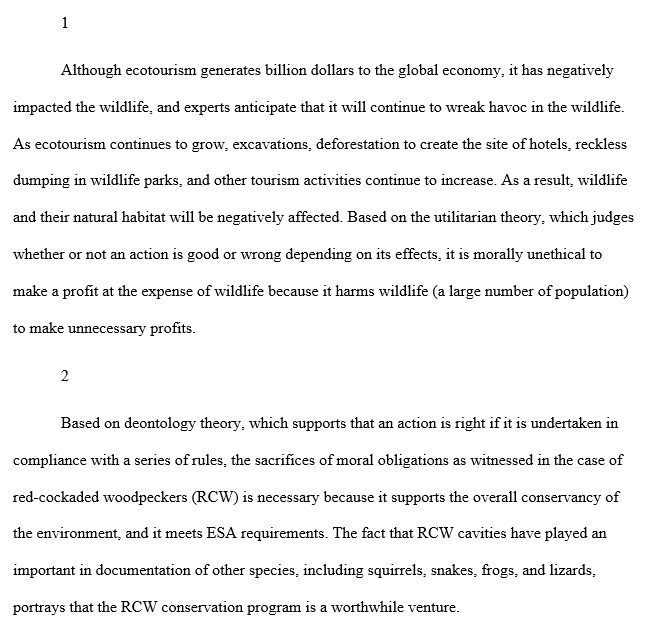Ecotourism became one of the most popular tourism industries and it is the world’s largest profit-making enterprise.
am Economy and Environment
1.Ecotourism became one of the most popular tourism industries and it is the world’s largest profit-making enterprise. “In 1997, people traveling internationally for pleasure spent $425 billion on everything from hotels to meals to taxis to museum tickets, according to the World Tourism Organizations.” Like Wamsley, most of the entrepreneurs are aware of this growing industry. As these industries are growing, do you think it will come to a point where wildlife is majorly be impacted by it, or is it already, or the profit that is gained by this industry outcomes interfering to wildlife? Is it morally ethical to gain profit out of wildlife? (Burcin Asilturk)
2.Functioning similarly to the carbon cap and trade system we discussed in week 2, breeding pairs of red-cockaded woodpeckers were set at a target amount in forests in Florida and as long as the owners of these forests were meeting that target, they could do as they please with the forest and land, and surplus pairs could be “used by the company to offset ESA requirements” (159) elsewhere. Are these kinds of sacrifices of moral obligations to the environment ultimately necessary in the overall conservation of animal species? Why or why not? (Carolyn Brinckwirth)
3.The red-cockaded woodpecker experienced high rates of breeding in Florida and “caused the value of land for woodpecker breeding to greatly exceed its value as a source of timber. “ The conservation of the woodpecker species ended up producing great economic value, and companies continued to fight to breed more. A survey conducted in the 1980s asked people how much money they are willing to pay to conserve natural resources where a lot of choices were aesthetically motivated. Is this the kind of decision process that should determine which species need saving? Aside from the BioTrack software discussed in the reading, are there other ways to keep track of endangered species and maintain biodiversity standards? (Aissa Avila)
4.Based on the steps that are laid out in the first paragraph on page 46 of “The Fallacy of Supply and Demand”, these will help us become aware of our vulnerabilities when it comes to anchoring, self-herding, and arbitrary coherence. Is there anything that you have recently bought or are planning on buying? Can you map out your thought processes through these steps?
(How did it begin, what amount of pleasure will you be getting (or have received), could you cut back a little and better spend the remaining money on something else?)
5.The text shows us that oftentimes, we assign unfair prices to goods. The “value” that we assign something differs widely depending on the circumstances we are in. The author uses the commercialization of black pearls as an example of an item that has no inherent value, but still costs a lot of money.
For the first question, I’d like you to imagine a world where every item that is good or sold is priced fairly. In this world, an iPhone would not cost $1000, it would only cost the amount of money that it took for Apple to produce the phone. What would that world look like? Would it be preferable to our current economic model?
6.What are the factors that lead to someone spending a large amount of money on something that has no utilitarian value? Why is there a market for clothes that cost thousands of dollars, or jewelry that costs millions of dollars?
7.Do you agree or disagree with the idea of a global tax described on pages 169-170? The author describes this as inevitable, but in a world right now where we have witnessed Brexit and such anti-globalization sentiment, do you think this is true? Should national interests rank above global interests or vice versa?
8.What is the effect of social inequality on the environment, and what do its thriving ecosystem networks teach us about structuring an ideal economy?
9.Is it truly more justifiable to steal non-monetary objects like the red pencil than to steal cash directly? If so, what differentiates the two?
10.In the experimental groups where a ‘moral reminder’ (i.e. 10 Commandments; MIT Honors Code) was implemented, based on the results, why do you think the students refrained from cheating? What does this reveal about the influence of morality reminders at the moment of one’s decision to be honest or dishonest?
11.What examples of dishonesty can be seen within those holding professional job titles? Do you think we need to implement more daily codes of morality within industries to ensure fair treatment from those holding influential power in their titles? Should there be consequences for those who commit dishonest acts?
Solution preview for the order on Ecotourism became one of the most popular tourism industries and it is the world’s largest profit-making enterprise.
APA
924 words
